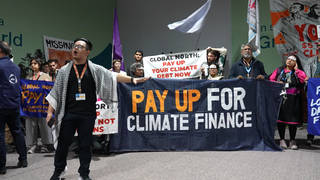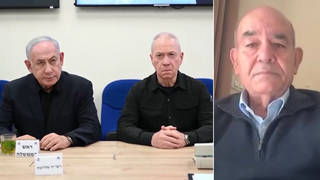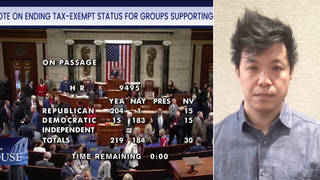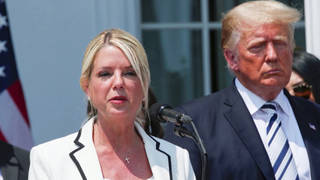HeadlinesDecember 19, 2013
White House Panel Calls for Reform of NSA Surveillance
A White House-appointed task force has proposed a series of curbs on key National Security Agency surveillance operations exposed by Edward Snowden. On Thursday, the panel recommended the NSA halt its bulk collection of billions of U.S. phone call records, citing “potential risks to public trust, personal privacy, and civil liberty.” The panel says telecommunications providers or a private third party should store the records instead. The panel also calls for banning the NSA from “undermining encryption” and criticizes its use of computer programming flaws to mount cyber-attacks. And it backs the creation of an independent review board to monitor government programs for potential violations of civil liberties. At the White House, Press Secretary Jay Carney said the panel’s findings will be reviewed.
White House Press Secretary Jay Carney: “Over the next several weeks, we will be reviewing the review group’s report and its 46 recommendations as we consider the path forward, including sorting through which recommendations we will implement, which might require further study, and which we will choose not to pursue.”
Greenwald: NSA Seeks “Elimination of Individual Privacy Worldwide”
The White House-appointed panel’s report on National Security Agency reforms was released just two days after a federal judge ruled that the bulk collection of telephone data by the government is “almost Orwellian.” Speaking before a European Union hearing on mass surveillance, journalist Glenn Greenwald said the NSA’s goal is the elimination of individual privacy.
Glenn Greenwald: “The ultimate goal of the NSA is, along with its most loyal, one might say, subservient junior partner, the British agency GCHQ, when it comes to the reason why the system of suspicionless surveillance is being built — and the objective of this system is nothing less than the elimination of individual privacy worldwide.”
U.N. Assembly Approves Landmark Privacy Resolution
The U.N. General Assembly approved a landmark measure Wednesday affirming privacy rights against unwarranted government surveillance. Germany and Brazil drafted the resolution after the leaks of Edward Snowden showed widespread U.S. spying abroad. The measure was weakened at the request of the United States and Britain to omit a declaration that foreign surveillance could amount to “human rights violations and abuses.”
U.S. Releases 2 Sudanese Prisoners; Bill Would Free Up to Half of Remaining Guantánamo Detainees
The United States has released two Guantánamo Bay prisoners back to their native Sudan. Both were imprisoned at Guantánamo Bay since 2002. Their repatriation comes days after two Saudi Arabian prisoners were sent home. The Guantánamo prison population now stands at 158. Up to half of the prisoners could be cleared for transfer to their home countries under a bipartisan deal set for passage in the Senate this week. It is the first time since President Obama came to office that Congress has moved to ease restrictions on Guantánamo instead of strengthening them. But the measure would maintain the congressional ban on transfer of prisoners to the United States.
Senate Approves 2-Year Budget Deal Without Jobless Benefits
The Senate has approved a two-year budget deal following passage by the House last week. The deal eases across-the-board spending cuts, but does not extend unemployment benefits for some 1.3 million people, which are set to expire next week. Democratic Sen. Patty Murray, who crafted the bipartisan deal with Republican Rep. Paul Ryan, called it a step forward.
Sen. Patty Murray: “The Bipartisan Budget Act puts jobs and economic growth first by rolling back those automatic and harmful cuts to education and medical research and infrastructure investments and defense jobs for the next two years. If we didn’t get a deal, we would have faced another continuing resolution that would have locked in those damaging automatic cuts, or worse, a potential government shutdown in just a few short weeks.”
The bill’s passage reduces the chances of another government shutdown at the beginning of the year. Congress will have until January 15 to approve a series of spending measures under the new 2014 limit of more than $1 trillion.
Fed to Scale Back Monthly Bond Purchases
The Federal Reserve has announced plans to scale back its monthly economic stimulus program. Under a policy called “quantitative easing,” the Fed has spent $85 billion a month buying up Treasury and mortgage bonds in a bid to trigger economic growth. On Wednesday, Fed Chair Ben Bernanke said economic improvements will lead to reducing the program by $10 billion a month.
Ben Bernanke: “Despite significant fiscal headwinds, the economy has been expanding at a moderate pace, and we expect that growth will pick up somewhat in coming quarters, helped by highly accommodative monetary policy and waning fiscal drag. The job market is continuing to improve with the unemployment rate having declined further. At the same time, the recovery clearly remains far from complete, with unemployment still elevated and with both underemployment and long-term unemployment still major concerns.”
Bernanke steps down as Fed chair next month, to be replaced by Janet Yellen. In what was likely his final news conference as head of the Federal Reserve, Bernanke was asked what he would have done differently.
Ben Bernanke: “We were slow to recognize the crisis. I was slow to recognize the crisis. In retrospect, it was a traditional, classic crisis, but in a very, very different guise. Different types of financial instruments, different types of institutions have made it, for a historian like me, more difficult to see. Whether or not we could have prevented it or done more about it, that’s another question.”
South Sudan Violence Fears of Civil War
Growing violence in South Sudan is raising fears of a civil war. Around 500 people have been killed and thousands displaced in fighting between government forces and troops loyal to a rival general. Rebel forces seized control of the flashpoint town of Bor earlier today.
Amnesty: Both Sides Committing War Crimes in CAR
Amnesty International is warning both sides of the sectarian conflict in the Central African Republic are committing war crimes. Hundreds of people have died in clashes between government-backed Muslim fighters and rebel Christian militias. According to Amnesty, the fighting has displaced around 614,000 people nationwide. About 1,000 people were killed in clashes over a two-day period.
Russian Lawmakers Approve Mass Amnesty Bill; Pussy Riot Members Set for Release
The Russian parliament has approved a mass amnesty to thousands of prisoners, including members of the punk group Pussy Riot and the Greenpeace Arctic 30. Up to 22,000 people will be freed under an initiative proposed by Russian President Vladimir Putin. The Greenpeace Arctic 30 were arrested in September after trying to stop Russian oil drilling in the Arctic. After the vote, Arctic 30 member Faiza Oulahsen said she remains worried for her Russian colleagues.
Faiza Oulahsen: “For now, I’m not excited. We are being granted amnesty for peacefully protesting in the Arctic. We did nothing wrong. We’ve spent (time) in jail for doing nothing wrong, and now we are deemed guilty, but granted amnesty, and 26 of us will be able to go home after this, sooner or later. But what will this mean for our Russian colleagues who still have the rest of their lives in this country?”
The two Pussy Riot members could be freed in the coming days after their arrest for performing in a Moscow church nearly two years ago. Family members say the amnesty comes too late, as they were already approaching the end of their terms.
LGBT Athletes Among U.S. Delegates to Russia Olympics
The Obama administration has named two LGBT athletes as part of the official U.S. delegation to the Winter Olympics in Sochi, Russia. Tennis legend Billie Jean King and women’s hockey player Caitlin Cahow will be among those representing the United States. The move is seen as a rebuke of Russia’s crackdown on LGBT rights, including a new law criminalizing the so-called “promotion of homosexuality.” At the White House, Press Secretary Jay Carney played down the symbolism of the delegate picks.
White House Press Secretary Jay Carney: “This delegation represents the diversity that is the United States. All our delegation members are distinguished by their accomplishments in government service, in civic activism and in sports. And we are proud of each and every one of them and think they will serve as great ambassadors of the United States to the Olympic Games. We have been very clear — the president has been very clear that he finds it offensive, the anti-LGBT legislation in Russia, for example.”
India Asks U.S. to Drop Charges Against Diplomat; Kerry Voices “Regret”
India is calling on the United States to drop charges against a diplomat accused of underpaying a domestic helper and committing visa fraud to win her entry into the country. Devyani Khobragade, India’s deputy consul general in New York, was arrested last week and strip-searched, prompting Indian government charges of mistreatment and potentially even conspiracy. In Washington, a State Department spokesperson said Secretary of State John Kerry has expressed “regret” to the Indian government.
Marie Harf: “As a father of two daughters about the same age [as Devyani Khobragade], the secretary empathizes with the sensitivities we are hearing from India about the events that unfolded after the arrests. And in his conversation with National Security Adviser Menon, he expressed his regret, as well as his concern that we not allow this unfortunate public incident to hurt our close and vital relationship with India.”
Report: Widespread Abuses in Secret Prisons of Assad Regime, Islamist Rebels
Two new reports are warning of massive human rights violations in secret prisons run by the Syrian government and by Islamist rebels. United Nations investigators say Syrian activists and other citizens have disappeared in a “widespread campaign of terror against the civilian population” by the regime of Bashar al-Assad. The United Nations says the enforced disappearances of Syrian civilians amount to a crime against humanity. A separate study by Amnesty International says the al-Qaeda-linked Islamic State in Iraq and the Levant is operating at least seven secret prisons in rebel-controlled areas of northern Syria. Amnesty says prisoners are facing “a shocking catalogue of abuses” including “torture, flogging, and summary killings.” The rebels’ prisoners include children as young as eight years old.
Most popular
- 1
- 2
- 3
- 4
Non-commercial news needs your support
Please do your part today.











Media Options